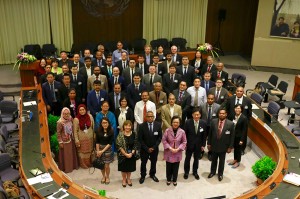Prof. Xue Presenting at UN Forum
 UNESCAP organized the Forum on Trade Digitization for Sustainable Regional Integration on 14 MAR 2019 TO 15 MAR 2019 in BANGKOK, THAILAND. The Forum addressed the regional and global initiatives on electronic exchange of trade-related data and documents for trade digitization, shared their current progress and lessons learnt during implementation, and discussed way forward in making them better contribute to sustainable regional integration. Prof. Xue presented on Framework Agreement’s Mutual Recognition Mechanism in Session 5 Enabling mutual recognition of electronic data in cross-border paperless trade transactions on 15 March and was applauded by the officials and experts from Asia Pacific countries as the most insightful legal guide for implementing the Framework Agreement.
UNESCAP organized the Forum on Trade Digitization for Sustainable Regional Integration on 14 MAR 2019 TO 15 MAR 2019 in BANGKOK, THAILAND. The Forum addressed the regional and global initiatives on electronic exchange of trade-related data and documents for trade digitization, shared their current progress and lessons learnt during implementation, and discussed way forward in making them better contribute to sustainable regional integration. Prof. Xue presented on Framework Agreement’s Mutual Recognition Mechanism in Session 5 Enabling mutual recognition of electronic data in cross-border paperless trade transactions on 15 March and was applauded by the officials and experts from Asia Pacific countries as the most insightful legal guide for implementing the Framework Agreement.
This event was organized as part of the Sixth Asia-Pacific Trade and Investment Week, 11-15 March 2019. The Sixth Asia-Pacific Trade and Investment Week was held in Bangkok from 11-15 March under the theme ‘Navigating Non-tariff Measures towards Sustainable Development’. Asia-Pacific Trade and Investment Week brought together government officials and other stakeholders every two years for discussions on issues of importance to trade and investment policy making in the region. Drawing on the presence of senior policymakers from across the Asia-Pacific region, the week hosted a number of engaging events related to trade and investment policy making, covering areas such as trade facilitation, trade and investment agreements, science, technology and innovation (STI) policies and responsible business practices. The ESCAP Committee on Trade and Investment (Invitation only) — the key platform for regional dialogue and intergovernmental collaboration on trade and investment —convened its sixth session during the Week, from 13 to 15 March 2019.
Permalink Comments off
![IMG_1341[1]](http://wiki.iipl.org.cn/wp-content/uploads/2019/02/IMG_13411-300x225.jpg)
![IMG_1370[1]](http://wiki.iipl.org.cn/wp-content/uploads/2019/02/IMG_13701-e1549423594445-187x250.jpg)
![IMG_1359[1]](http://wiki.iipl.org.cn/wp-content/uploads/2019/02/IMG_13591-e1549422946424-187x250.jpg)


